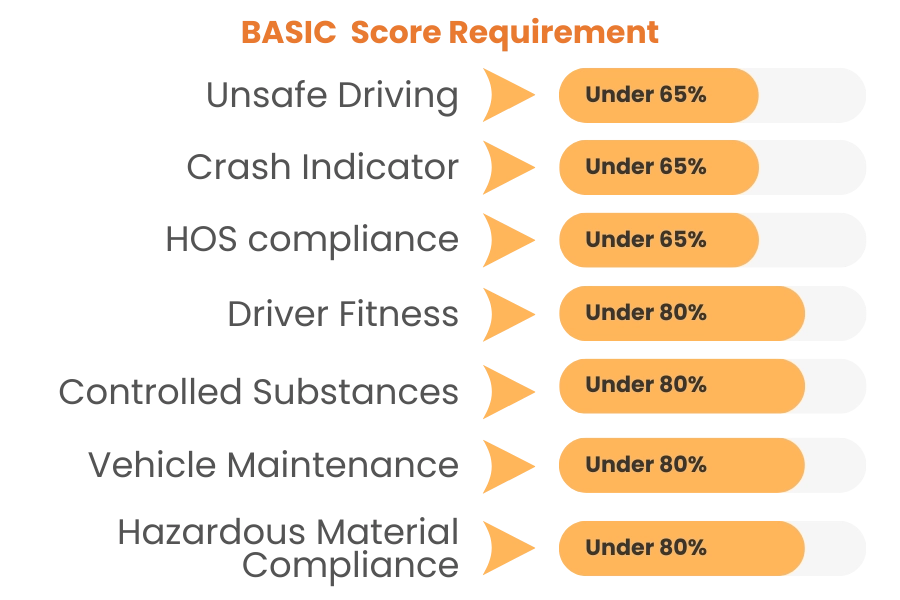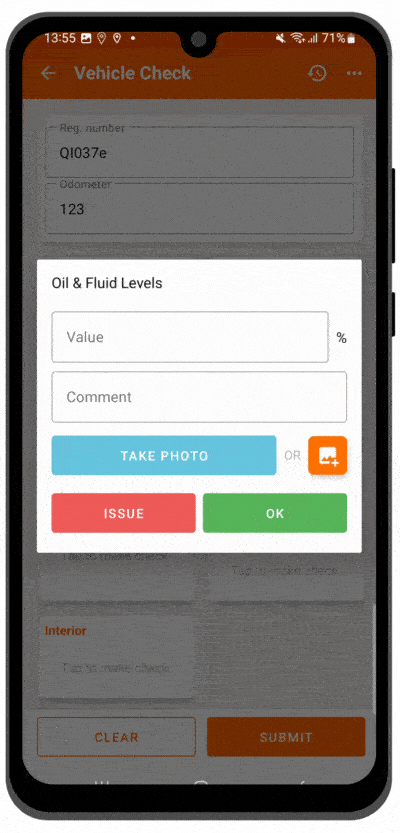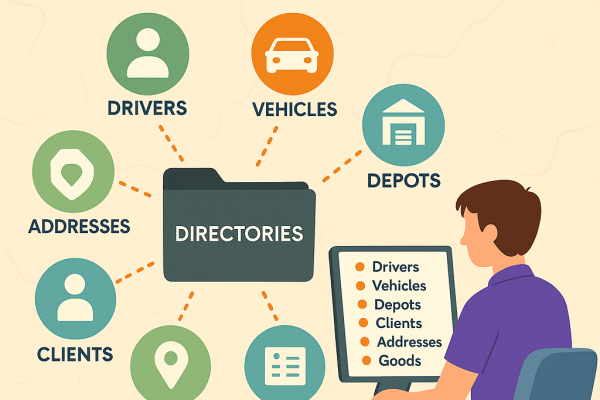CSA Scores: How to Improve Them?

by
Jennifer Collins
March 19, 2024
In trucking and transportation, keeping things safe and following rules is crucial. This includes paying close attention to CSA scores, which are all about safety and following regulations.
Usually, an owner-operator will drive around 2.8 million miles in their career. Most of them do this without any significant accidents that must be reported to the Department of Transportation. This makes it clear that there's a strong link between how safely they drive and their CSA (Compliance, Safety, Accountability) scores.
These drivers often work for over 30 years, spending two-thirds of that time as owner-operators. Their long experience highlights how crucial it is to focus on safety and follow the rules strictly.
In this article, we'll explore strategies to enhance CSA scores and provide guidance on checking your score.
Understanding CSA scores
CSA scores show how well a trucking company follows safety rules and performs overall.
The Federal Motor Carrier Safety Administration (FMCSA) is a group that calculates safety scores. They consider road inspections, crash reports, and other reviews to determine these scores.

What affects CSA scores? It's stuff like driving safely, keeping trucks in good shape, following work-hour rules, and past crashes.
A company with a high CSA score may experience increased legal due diligence as well as suffer from direct financial hits, such as increased insurance prices.
On the other hand, a low CSA score shows that a company is serious about keeping things safe and following rules. This can make the company look good and help it grow.
Seven factors that influence CSA scores
The CSA (Compliance, Safety, Accountability) program evaluates carriers based on seven Behavior Analysis and Safety Improvement Categories (BASICs).
Every BASIC category helps figure out a transport company's safety score. This tells us how safe and rule-following they are in their industry.
Here's what each category looks at:
- Unsafe driving: This includes things like driving too fast, not driving carefully, changing lanes when it's not safe, and not paying attention while driving.
- Hours-of-Service (HOS) compliance: Checks if drivers are following the rules about how long they can drive without taking breaks and ensuring they rest enough.
- Driver fitness: Looks at whether drivers have the right qualifications, health checks, and licenses to drive safely.
- Controlled substances/alcohol: This part is about handling problems that come from using drugs or alcohol. It covers testing for these substances and offers programs to help people who are struggling with drug or alcohol use.
- Vehicle maintenance: This ensures that trucks and other big vehicles are well taken care of, ensuring they're safe to drive on the road.
- Hazardous materials (HM) compliance: Check if companies follow the rules when moving dangerous materials around.
- Crash indicator: Looks into how often a company has had accidents and how bad those were to understand their safety history.
How to check your CSA score?
If you want to check your CSA score free, here's what you can do:
- Go to the FMCSA website: This is short for Federal Motor Carrier Safety Administration. They let you see the Safety Measurement System (SMS), where CSA scores are found. You can look up a particular carrier or check safety information for various companies.
- Carrier’s website: Some trucking companies may display their CSA scores online. Look for a section related to safety or compliance.
- Third-party tools: Some third-party tools and websites allow you to check CSA scores. These platforms aggregate data from various sources and provide insights into a carrier’s safety performance.

Here are some of the common confusions or questions people might have regarding CSA score checking:
1. Can I check my CSA scores for multiple companies?
Yes, you can check CSA scores for multiple companies by entering their respective DOT numbers, MC numbers, or USDOT numbers into the SMS portal search bar.
2. How often should I check my CSA scores?
It's a good practice to check your CSA scores regularly to stay informed about your compliance and safety performance. Consider checking your scores at least quarterly or after significant operational changes.
3. Can I dispute inaccuracies in my CSA scores?
Yes, carriers can challenge and dispute inaccuracies in their CSA scores through the DataQs system provided by the FMCSA.
4. Are there third-party services for checking CSA scores?
While some third-party websites may offer CSA score lookup services, it's recommended to use the official FMCSA SMS portal for accurate and reliable data.
Common issues that affect CSA scores
For trucking and transportation companies, knowing the common problems that can lower their CSA scores is essential. By knowing these problems well, they can plan to reduce risks, make things safer, and keep their CSA scores high. Understanding these issues helps them avoid breaking the rules, decrease dangers, better protect their good name, run more smoothly, and help make roads safer.
This results in an overall improvement in performance.
Some examples of actions that could increase CSA scores include:
Unsafe driving behaviors
Unsafe driving includes things like going too fast, not paying attention while driving, changing lanes in a risky way, and other similar actions. These bad habits can lead to getting points that affect a driver's safety score.
The more serious the action, like speeding a lot over the limit, the more points they get compared to smaller mistakes, such as not signaling when they should.
Hours-of-Service (HOS) violations
Special rules limit how long truck drivers can drive without taking breaks, known as Hours-of-Service (HOS). If drivers ignore these rules and drive too much without resting, it's a big deal. This is because being too tired can make driving dangerous and lead to more accidents. Depending on how much they broke these rules, their safety score could increase significantly.
Vehicle maintenance issues
This means there are issues with the car like brakes not working well, lights being out, or tires being worn down. These problems show that the vehicle isn't being handled properly and could be dangerous to drive.
Depending on how serious these issues are, you can get points added up, which, if too high, can lead to bigger problems.
Driver fitness concerns
This includes situations where someone is driving a commercial vehicle without the right license or has yet to pass the health checks needed for driving. These issues make it questionable whether the driver is able to drive big cars safely.
Getting points for these violations also affects scores that measure safety and rules following, showing why drivers must have their proper licenses and health approvals.
Controlled substances and alcohol violations
When someone drives after using drugs or alcohol, it can lead to serious issues. They might get caught for DUI, which means driving under the influence or get in trouble for having alcohol with you at work.
These actions are dangerous for everyone on the road and can lead to serious consequences, including adding points to something called CSA scores.
It's imperative not to use substances to keep these scores low and ensure your workplace is safe.
Hazardous materials compliance
When it comes to carrying dangerous goods, following specific rules is a must for safety. If someone doesn't handle, label, or document these materials correctly, they could face big fines and negatively affect their CSA scores.
Since transporting hazardous materials can be risky, adhering to all regulations helps avoid trouble with CSA scores.
Crash history
This part discusses how often crashes involve large vehicles and how severe they are. Even though crashes aren't considered violations by themselves, they still play a role in determining CSA scores, which affects how safe a carrier is.
Taking steps ahead of time for safety and encouraging drivers to be cautious can help lower the chances of accidents happening and keep CSA scores in good standing.
Strategies for improving your CSA score
Making your CSA score better is vital for a few big reasons. Having a good CSA score shows that you're serious about safety and following the rules, which can make people think more highly of you in your field and bring in more business.
Also, keeping your CSA score low means you won't have to pay lots of fines or deal with trouble from the people who enforce the rules, saving you money and headaches down the line.
Plus, a solid CSA score proves that you care about keeping everyone safe on the road—your drivers, other people driving, and folks walking around—which builds trust with everyone involved.
If you work on getting your CSA score up by using smart plans, you cut down on risks and legal issues and set yourself up for doing well over time in this tough industry.
Let's see how you can improve your CSA scores:
1. Focus on training programs
Start thorough training programs that teach drivers about safe driving, following rules, and how to drive defensively. These trainings often ensure drivers know the latest on how to be safe and lower the chance of breaking laws.
2. Implement rigorous vehicle maintenance protocols
Set up strict checks and care routines for all your vehicles to ensure they're in good shape and safe.
Check them regularly, fix problems quickly, and keep detailed records of all upkeep work to show you're following safety standards.
3. Use data analysis and monitoring tools
Use tech tools to watch over driver behavior, how well vehicles are running, and if you're meeting set standards. Keeping an eye on important data helps spot areas that need work early on so you can fix them before they lead to bigger issues.

Track-POD is a software that can help improve your company's safety score by making it easier to follow the rules and keep things safe in many ways. It has features like live location tracking, finding the best routes, and digital delivery confirmation.
With Track-POD, you can better watch how drivers behave, check on vehicles, and make sure rules are followed more closely. Using what Track-POD offers lets you quickly find areas that need work, spot safety issues early on, and stop rule-breaking before it happens.
Also, its tools for reports and analysis give deep insights into how well your fleet is doing with following rules, which makes checking everything much smoother and helps ongoing efforts to do better.
4. Conduct regular compliance audits
Carry out regular checks to ensure your work follows safety rules and find ways to do better. Work with experts who know about these rules well so you're doing things correctly according to what's required.
5. Implement driver performance reviews
Look at how your drivers are doing regularly. See if they are following safety rules and where they can improve. Give them helpful advice, more training if needed, and praise those who always drive safely.
6. Foster a continuous improvement culture
Use tech tools like tracking systems and cameras to manage your vehicles. These help you watch how drivers behave, how the vehicles are running, and whether you're meeting safety standards as it happens.
This tech can alert you early to any possible safety issues, helping you stop problems before they start.
CSA score final words: Take action today for safer roads tomorrow!
Working on keeping CSA scores high is really important. It helps trucking companies follow the rules, stay safe, and do well in the long run.
It's super important for people in this field to be ahead of the game when it comes to following rules and staying safe because it brings many benefits, like helping their business grow and moving forward in their careers.
When companies adopt these practices, they protect what they've built and build a strong reputation that draws more work opportunities and makes the roads safer for everyone.
About The Author
Jennifer Collins
A seasoned content writer with a passion for unraveling the intricate world of logistics through words.








